Rob Bignell's Blog, page 342
March 3, 2014
Avoid here-to-there action in storytelling
If your 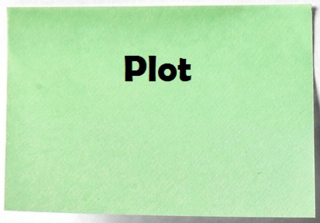 story feels like it’s dragging, you may want to look at what “action” is provided to readers. You might be giving too many “here-to-there” steps.
story feels like it’s dragging, you may want to look at what “action” is provided to readers. You might be giving too many “here-to-there” steps.
Here-to-there actions occur when the writer over-describes interim steps between actions that really matter to the plot. For example, if the story’s hero jumps into his car to chase a criminal, the writer would tell readers that the character placed the key into the ignition.
There’s no need to do that, though. All the reader needs to know is that our hero got into the vehicle and sped off. Readers are savvy enough to infer that to speed off the hero placed a key into the ignition and turned it.
Describing the key turning typically wouldn’t advance the plot because it isn’t suspenseful. In addition, it probably isn’t relevant to the overall story because it doesn’t provide any context that would be useful to understanding the character, setting or theme.
The writer might make such here-to-there action suspenseful by making an obstacle for the character. In the above example, perhaps the hero has had trouble with his car’s starter, and it picks this inopportune time to not work for him. The writer also could use here-to-there action to provide context. For example, in a science fiction story, perhaps the hero doesn’t need a key but instead must tell the vehicle’s AI to start moving; this context helps establish the story’s setting.
Need an editor? Having your book, business document or academic paper proofread or edited before submitting it can prove invaluable. In an economic climate where you face heavy competition, your writing needs a second eye to give you the edge. I can provide that second eye.
Related articles
 Use broad conflict to set your story in motion
Use broad conflict to set your story in motion Five Great Quotations about Characters
Five Great Quotations about Characters Avoid shifting point of view in your story
Avoid shifting point of view in your story Select right word to avoid reader confusion
Select right word to avoid reader confusion Five Great Quotations about Business of Writing
Five Great Quotations about Business of Writing
March 2, 2014
Five Great Quotations about Writing SF
“If it 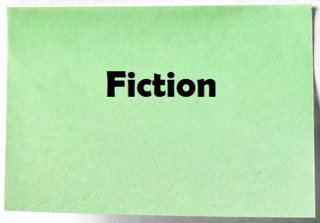 has horses and swords in it, it’s a fantasy, unless it also has a rocketship in it, in which case it becomes science fiction. The only thing that’ll turn a story with a rocketship in it back into fantasy is the Holy Grail.” – Debra Doyle
has horses and swords in it, it’s a fantasy, unless it also has a rocketship in it, in which case it becomes science fiction. The only thing that’ll turn a story with a rocketship in it back into fantasy is the Holy Grail.” – Debra Doyle
“To write good SF today...you must push further and harder, reach deeper into your own mind until you break through into the strange and terrible country wherein live your own dreams.” – Gardner Dozois
“Science fiction writers, I am sorry to say, really do not know anything. We can’t talk about science, because our knowledge of it is limited and unofficial, and usually our fiction is dreadful.” – Philip K. Dick
“In science there is a dictum: don’t add an experiment to an experiment. Don’t make things unnecessarily complicated. In writing fiction, the more fantastic the tale, the plainer the prose should be. Don’t ask your readers to admire your words when you want them to believe your story.” – Ben Bova
“I don’t think the scientific method and the science fictional method are really analogous. The thing about them is that neither is really practiced very much, at least not consciously. But the fact that they are methodical does relate them.” – Frederik Pohl
Need an editor? Having your book, business document or academic paper proofread or edited before submitting it can prove invaluable. In an economic climate where you face heavy competition, your writing needs a second eye to give you the edge. I can provide that second eye.
Amazon.com WidgetsRelated articles
 Mimic sounds to appeal to sense of hearing
Mimic sounds to appeal to sense of hearing Coming up with great story ideas
Coming up with great story ideas Five Great Quotations about Editing
Five Great Quotations about Editing Five Great Quotations about Why We Must Write
Five Great Quotations about Why We Must Write
March 1, 2014
Don’t let personal turmoil stymie your writing
My writing 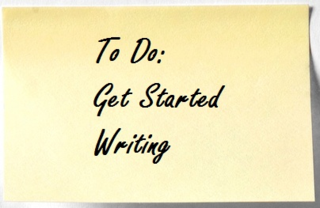 is in my control.
is in my control.
All too often, problems in a writer’s life negatively affects the ability to write. Never mind that the personal issue requires attention, draining away valuable writing time. The issue itself distracts the mind, so that rather focusing on a manuscript, the writer finds this turmoil dominating one’s thoughts.
In short, unable to concentrate, the writer is unable to be creative.
Rather than think of turmoil as an obstacle to writing, though, embrace the opportunities it provides.
Good writers see every situation as an idea for a story. Indeed, as a good reader you’ve probably noticed there are any number of books out there deal with the issues you face, that examine the very themes of your life.
How you wind your way through this turmoil, the solutions you contemplate and either attempt or reject, the emotions you experience during this difficult time, all make for a great story. You have plot and characters right before you. Now you can add your own perspective to the pool of literature about this topic, and you have theme.
While turmoil may prevent you from writing at the moment, you certainly can take notes and even outline.
And once you start writing, you likely will find it cathartic. Why?
Because you control your story. While you may not be able to control the variables affecting your personal life, that’s not so with your tale. You are the god shaping the universe on your computer screen or notebook.
That’s why you always can say to yourself, “My writing is in my control.”
Need an editor? Having your book, business document or academic paper proofread or edited before submitting it can prove invaluable. In an economic climate where you face heavy competition, your writing needs a second eye to give you the edge. I can provide that second eye.
<A HREF="http://ws-na.amazon-adsystem.com/widg... Widgets</A>Related articles
 What to look for when revising your manuscript
What to look for when revising your manuscript Making sense of sensuous vs. sensual
Making sense of sensuous vs. sensual Submitting do's and don'ts for magazines
Submitting do's and don'ts for magazines
February 28, 2014
Write then publish your next book
The more  books you write, the more you’ll sell. Generally speaking, don’t devote yourself solely to promoting a single book for months on end. Promote it a lot during the first few weeks after its release but then taper off to just one effort a day as you dedicate the bulk of your time to writing the next book. Sales of your first book will go up with the publication of your second one. Before the “7 Minutes a Day…” series, I wrote four books, and inevitably each boosted sales of the ones published before it. In fact, if doing a countdown of which of my books have sold the most copies, it would correlate perfectly with how many weeks it’s be available for sale…often the longer the book has been out, the higher the sales.
books you write, the more you’ll sell. Generally speaking, don’t devote yourself solely to promoting a single book for months on end. Promote it a lot during the first few weeks after its release but then taper off to just one effort a day as you dedicate the bulk of your time to writing the next book. Sales of your first book will go up with the publication of your second one. Before the “7 Minutes a Day…” series, I wrote four books, and inevitably each boosted sales of the ones published before it. In fact, if doing a countdown of which of my books have sold the most copies, it would correlate perfectly with how many weeks it’s be available for sale…often the longer the book has been out, the higher the sales.
Need an editor? Having your book, business document or academic paper proofread or edited before submitting it can prove invaluable. In an economic climate where you face heavy competition, your writing needs a second eye to give you the edge. I can provide that second eye.
Amazon.com Widgets
Related articles
 Common 'first draft-itis' symptoms to look for
Common 'first draft-itis' symptoms to look for Delete bookisms in your story's dialogue
Delete bookisms in your story's dialogue How to pen engaging dialogue for yoru story
How to pen engaging dialogue for yoru story Mastering the fine art of dialogue punctuation
Mastering the fine art of dialogue punctuation Five Great Quotations about Editing
Five Great Quotations about Editing
February 27, 2014
Editing client published second comedic novel
An editing 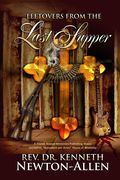 client of mine, Kenneth Newton-Allen, has published his second satirical novel, “Leftovers from the Last Supper.” The book tells the tale of Reverend “Burley” Jesus (pronounced hay-seuss) McWhurley, the nation’s most prominent preeminent all-media evangelist, who hoping to raise money to build the greatest cathedral in Christendom that God has apparently directed him to build in Beverly Hills, embarks on a nationwide debating tour with atheist E. Mason Hyde, an obscure writer just hoping to promote his unknown book. When the tour is over, however, Hyde is startled to find a stranger at his door who claims that he is Jesus (pronounced gee-sus) Christ. Is this stranger professing to be Jesus merely a ploy by Burley? Is this stranger just another wretched mental defect who honestly believes that he is Jesus? Or is this stranger in reality Jesus Christ, making what would have to be billed as history’s Ultimate Comeback? The book is available for purchase online.
client of mine, Kenneth Newton-Allen, has published his second satirical novel, “Leftovers from the Last Supper.” The book tells the tale of Reverend “Burley” Jesus (pronounced hay-seuss) McWhurley, the nation’s most prominent preeminent all-media evangelist, who hoping to raise money to build the greatest cathedral in Christendom that God has apparently directed him to build in Beverly Hills, embarks on a nationwide debating tour with atheist E. Mason Hyde, an obscure writer just hoping to promote his unknown book. When the tour is over, however, Hyde is startled to find a stranger at his door who claims that he is Jesus (pronounced gee-sus) Christ. Is this stranger professing to be Jesus merely a ploy by Burley? Is this stranger just another wretched mental defect who honestly believes that he is Jesus? Or is this stranger in reality Jesus Christ, making what would have to be billed as history’s Ultimate Comeback? The book is available for purchase online.
Need an editor? Having your book, business document or academic paper proofread or edited before submitting it can prove invaluable. In an economic climate where you face heavy competition, your writing needs a second eye to give you the edge. I can provide that second eye.
<A HREF="http://ws-na.amazon-adsystem.com/widg... Widgets</A>Related articles
 Editing client releases adventure/crime novel
Editing client releases adventure/crime novel Editing client releases quest novel sequel
Editing client releases quest novel sequel Utilize Chekhov's gun to make plot work
Utilize Chekhov's gun to make plot work Coming up with great story ideas
Coming up with great story ideas
February 26, 2014
Serial comma: Use, don't use, or don’t worry?
A number 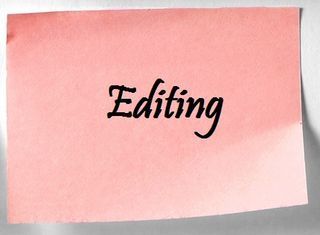 of grammarians, teachers often think that punctuation, capitalization, spelling and grammar rules are absolute. The reality is that grammar hardly is black and white. It evolves over time, and depending on your current location in the world – the United States or the British Commonwealth; Canada or England – different rules generally are considered the norm of what constitutes proper English. Indeed, even within a country, various editors and teachers will espouse conflicting rules.
of grammarians, teachers often think that punctuation, capitalization, spelling and grammar rules are absolute. The reality is that grammar hardly is black and white. It evolves over time, and depending on your current location in the world – the United States or the British Commonwealth; Canada or England – different rules generally are considered the norm of what constitutes proper English. Indeed, even within a country, various editors and teachers will espouse conflicting rules.
One such rule is that of the serial comma (aka the series comma, Oxford comma, or Harvard comma). For example, The MLA Style Manual, The Chicago Manual of Style, Strunk and White’s Elements of Style, and the U.S. Government Printing Office Style Manual all give one rule while the Associated Press Style Manual gives a contradictory rule...and the AP rule generally matches what most British style guides say, though even in Merry Ol’ England not all grammarians agree.
The serial comma rule issue centers on whether a comma is needed in a list. For example, in the sentence California, Oregon and Washington border the Pacific Ocean, should a comma appear after the second to last item on the list (Oregon)? The MLA Style Manual, The Chicago Manual of Style, Strunk and White’s Elements of Style, and the U.S. Government Printing Office Style Manual say “yes.” The Associated Press Style Manual and most British style guides say “no.”
Worse, these rules shift slightly when the listed items are phrases. Most stylebooks – including the Associated Press – say a comma is needed after the second to last item in a series of phrases, such as in the sentence: Common weapons used in science fiction stories include ray guys based on laser technology, disrupters that utilize concentrated sound waves, and plasma blasts of highly concentrated ionized gas.
When editing, I generally follow the Associated Press Style of Manual rules on the serial comma. Why? Because readers are less likely to think of it as an error as they primarily read media reports either in print or on the Internet that follow this style. In addition, many readers pick up books British Commonwealth authors who don’t use the Oxford comma in a series of single words.
All is relative, however. As a writer, you should follow a stylebook and stick to it. If your publisher follows The Chicago Manual of Style or your professor follow The MLA Style Manual, then that’s what you should go with. Whatever you do, be consistent with the style within the book.
Need an editor? Having your book, business document or academic paper proofread or edited before submitting it can prove invaluable. In an economic climate where you face heavy competition, your writing needs a second eye to give you the edge. I can provide that second eye.
Related articles
 Place commas inside quotation marks
Place commas inside quotation marks Getting to the core: Amid vs. amidst
Getting to the core: Amid vs. amidst
February 25, 2014
Incorporate imagery into your story
When 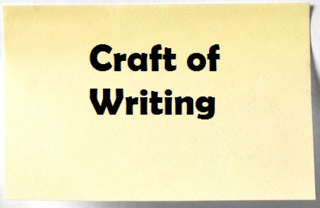 creating your story’s setting or explaining what your characters are doing, you’ll need to use imagery. Imagery is necessary to move along the plot and to establish tone.
creating your story’s setting or explaining what your characters are doing, you’ll need to use imagery. Imagery is necessary to move along the plot and to establish tone.
When describing a landscape, character or action, you’ll need to appeal to one or more of the senses that people use to perceive the world. There are five senses:
g Sight – What we can see with our eyes, as in Nevar examined the black hole ahead. It had the diameter of a mere asteroid. X-rays shot from the white-hot disc at its center, each ring farther out as darkening from white to blue.
g Sound – What we can hear, like As Nevar quietly assisted, her brother tapped here and there.
g Smell – The scent of something, as in The smell of sweat trickling down her temple overtook the faint whiff of ozone permeating the cockpit.
g Touch – What we can feel when things come into contact with our bodies (or they can be a description of the body’s sensation of touch), as in Nevar’s back ached.
g Taste – The flavor of something when it comes into contact with the tongue, as in Her mouth grew dry.
Using as many of the senses as possible makes a scene more real. In everyday life, we experience all of these five senses at all times. Sitting in a coffee shop writing this entry, I see the barista racing to and fro as filling an order, hear the hushed voices of the couple sitting behind me as they try to keep their disagreement from bursting into a public scene, taste the bitter coffee, catch a whiff of the pear-scented perfume of a woman passing my table on her way to the counter, shiver at the cold breeze from the air conditioner that is working on overdrive. In fiction, the key is to make these different senses work with one another to create tone.
When writing imagery, follow these guidelines:
g Make sure it serves a purpose – Any description should move along the plot and help develop characters and dramatic tension. If it’s solely being used to establish the location of the story or to indicate a background character’s actions, keep the description quick and simple.
g Avoid flowery prose simply for the sake of waxing poetic – Purple prose only makes the story campy.
g Remain cautious about offering lengthy descriptions – Descriptions in novels obviously can be longer than those in short stories. Still, the longer the description, the greater the chance that it will cause the reader to forget what’s going on in the story.
g Capture the “essence” of a place/moment/character through description – If a landscape is supposed to be inviting, then describe it as such by noting the ferns hanging over the waterfall, the bubbling brook, and the shade from a green willow. An inviting environment would not be excessively hot with the sun beating down.
g Use sensory details rather than internalized ones – Sensory details (blue, sour, loud, smooth) are specific rather than general. Internalized details (angry, pleased, innocent, civilized) amount to using fuzzy words and give no real impression of what is being described.
Need an editor? Having your book, business document or academic paper proofread or edited before submitting it can prove invaluable. In an economic climate where you face heavy competition, your writing needs a second eye to give you the edge. I can provide that second eye.
Amazon.com WidgetsRelated articles
 How to come up with an awesome story title
How to come up with an awesome story title Maintain sense of tension through pace
Maintain sense of tension through pace Create meaningful settings in your story
Create meaningful settings in your story
February 24, 2014
Consider using counterplotting in your novel
One solid 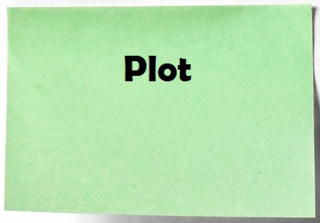 plotting strategy for a long novel – though it also will work in a novella or a long short story – is to split the main characters into two groups and alternate the focus of scenes or chapters between them. The two groups then reunite at the story’s climax. This technique is called counterplotting. It’s often is used in quest novels.
plotting strategy for a long novel – though it also will work in a novella or a long short story – is to split the main characters into two groups and alternate the focus of scenes or chapters between them. The two groups then reunite at the story’s climax. This technique is called counterplotting. It’s often is used in quest novels.
Counterplotting is a great way to achieve dramatic tension in a longer story. This can be done by ending each chapter or scene with a cliffhanger, which sets up the narrative hook for the next chapter or scene in which those characters appear. The writer keeps the suspense alive by making the reader wait to see what will happen.
Another advantages to counterplotting is that the writer can more easily build an image of the world through a “narrative collage” or a “kaleidoscopic” journey through it. Seeing the world solely through the eyes of a lone main character can be limiting.
More skilled writers tend to artfully use counterplotting by creating a parallel process between the two groups. For example, to resolve the story’s central problem, each group learns enough that they have a partial solution. When they come together, their partial solutions combined offer the actual answer for overcoming the antagonist.
An offshoot of counterplotting is the multi-stranded plot, when three or more groups form a narrative thread. This is most often used in disaster stories or tales with a large cast of main characters. The movie “Star Trek IV” employed it when Kirk and Spock as one group try to locate whales, Scotty, McCoy and Sulu as one group gathered materials to build a whale tank on their ship, and Uhura and Chekov as a third group try to find a nuclear reactor to re-energize the dilithium crystals.
The danger of counterplotting is the author can leave the reader in suspense for too long between chapters/scenes. In other cases, especially with multi-stranded tales, the plot becomes too complicated for readers to follow and enjoy. Ultimately, too many loose ends can occur at the story’s end, much to readers’ dissatisfaction.
Need an editor? Having your book, business document or academic paper proofread or edited before submitting it can prove invaluable. In an economic climate where you face heavy competition, your writing needs a second eye to give you the edge. I can provide that second eye.
Amazon.com Widgets
Related articles
 When should you start a new novel chapter?
When should you start a new novel chapter? Maintain sense of tension through pace
Maintain sense of tension through pace Basic guidelines for devising cliffhangers
Basic guidelines for devising cliffhangers Develop conflicts related to resolving your story's central problem
Develop conflicts related to resolving your story's central problem Constructing your story's main character
Constructing your story's main character
February 23, 2014
Five Great Quotes about the Business of Writing
“There are 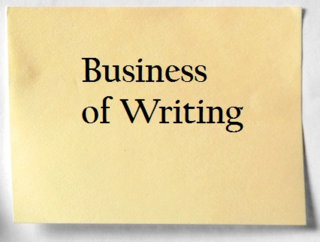 three difficulties in authorship: to write anything worth publishing – to find honest men to publish it – and to get sensible men to read it.” – Charles Caleb Cotton
three difficulties in authorship: to write anything worth publishing – to find honest men to publish it – and to get sensible men to read it.” – Charles Caleb Cotton
“Writers are schizophrenic. On the one hand we tell ourselves, ‘This is a work of genius! I’ve created Art!’ Then we try to peddle it, like a widget, to The New Yorker, Playboy, or SF Age.” – Ken Rand
“Most writers can write books faster than publishers can write checks.” – Richard Curtis
“Sir, nobody but a blockhead ever wrote except for money.” – Samuel Johnson
“Instead of marveling with Johnson, how anything but profit should incite men to literary labor, I am rather surprised that mere emolument should induce them to labor so well.” – Thomas Green
Need an editor? Having your book, business document or academic paper proofread or edited before submitting it can prove invaluable. In an economic climate where you face heavy competition, your writing needs a second eye to give you the edge. I can provide that second eye.
Related articles
 What is a writer's 'natural' temperament?
What is a writer's 'natural' temperament? How long and frequent should author's blog be?
How long and frequent should author's blog be? How do you know when your book is done?
How do you know when your book is done? Work off the fat from overwritten descriptions
Work off the fat from overwritten descriptionsFebruary 22, 2014
Don’t let fear hamper you: Dare to write
For many, 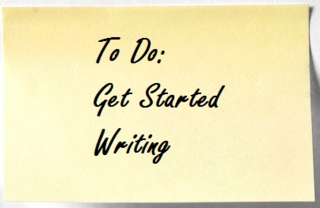 writing remains merely a hobby. If you find satisfaction in that, that’s all right. Many people enjoy sewing but don’t make clothes for a living; many people enjoy hiking but don’t become wilderness guides. A beloved pastime need not be turned into a career, and a written story or poem never need be published.
writing remains merely a hobby. If you find satisfaction in that, that’s all right. Many people enjoy sewing but don’t make clothes for a living; many people enjoy hiking but don’t become wilderness guides. A beloved pastime need not be turned into a career, and a written story or poem never need be published.
Regardless of one’s goals, though, virtually all writers want to pen something that they feel proud of. Unfortunately, writers tend to be excruciatingly self-critical of themselves – sometimes to the point that though they yearn to write they can’t bring themselves to commit words to paper or computer screen.
You probably are not afraid of writing but afraid of disappointing someone – your readers, your instructors, your family…and most likely yourself. You’ve become too judgmental of your writing and in doing so feed your fear so it has the power to control you.
Now be honest with yourself: You have no idea how others will receive your writing until you write and share it. Further, writers who are extremely judgmental of their abilities actually tend to produce quality books because they hold themselves to such a high standard! Your writing actually may be quit well-received.
Fortunately, there are many ways you can gather personal courage and dare to write:
g Ignore the bullies – Don’t listen to your inner voice (or others) who are critical of your writing. Allow yourself to write “poorly” realizing that you’ll only get better with each page you pen.
g Rethink why you write – Rather than write to master the craft of writing, write for the journey of self-discovery. Writing then becomes rewarding for reasons other than craftsmanship or being published.
g Start small – Rather than attempt too large of a project, such as a novel or even a short story, aim to write a lone paragraph or a single page. Don’t set yourself up for failure but work slowly and steadily toward completion of a project.
g Change the genre and style in which you write – Perhaps you’re more suited to write in a different genre or to write nonfiction instead of a novel. In addition, don’t force yourself to write in ways or to use techniques that you don’t agree with, even if that’s what the writing gurus say should be done.
g Write what you’re compassionate about – Don’t write about topics for which you feel no passion. Just because an issue, topic or theme is popular is no reason to waste words on it; in fact, doing so can make you a hack writer. Write for different reasons than simply being commercially successful.
g Find supporters – Network with like-minded, positive writers who offer constructive criticism and point out what is good about your writing. Encourage each other to write and keep at it.
g Never give up – Any goal worth achieving takes hard work. If you want to improve as a writer, if you want to become a respected writer, then you must write.
Need an editor? Having your book, business document or academic paper proofread or edited before submitting it can prove invaluable. In an economic climate where you face heavy competition, your writing needs a second eye to give you the edge. I can provide that second eye.
Amazon.com WidgetsRelated articles
 Five Great Quotations about Why We Must Write
Five Great Quotations about Why We Must Write Motivate yourself to write this year!
Motivate yourself to write this year! Coming up with great story ideas
Coming up with great story ideas Five Great Quotations about the Power of Writing
Five Great Quotations about the Power of Writing Five Quotes About Where Stories Come From
Five Quotes About Where Stories Come From



